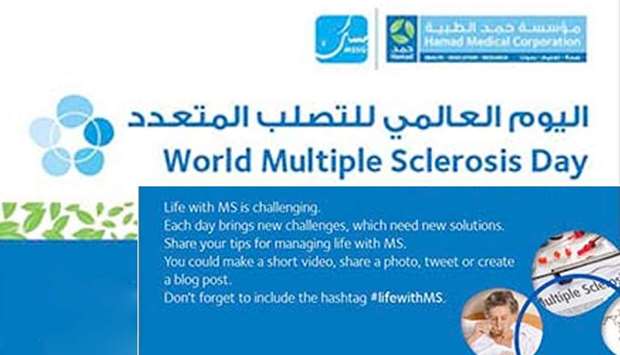More than 500 patients, mostly young females, are suffering from Multiple Sclerosis in Qatar, according to a physician from Hamad Medical Corporation ( HMC).
“If more than 2.5mn people in the world, mostly females between the ages of 17 and 27 years, are suffering from MS, the incidence rate in the Gulf area is around 9.6 to 17 cases per 100,000 people,” noted Dr Hassan al-Hail, senior consultant, medicine, HMC.
HMC's Neurology Department and the Multiple Sclerosis Society of Qatar (MSSQ) recently organised an awareness campaign to mark World Multiple Sclerosis Day and to highlight MS as a potentially disabling disease of the brain and spinal cord. The theme for this year’s global campaign is ‘Life with MS.’
World MS Day is officially marked on the last Wednesday of May each year, with events and campaigns taking place throughout the month.
The MS Day campaign events held across HMC this year aimed to educate staff and the public about the signs and symptoms of the disease and the importance of early detection and treatment.
Clinical and non-clinical staff from HMC, along with patients and their families, attended an educational workshop highlighting MS as the most common autoimmune disorder affecting the central nervous system.
Information booths, staffed by MSSQ members, were also set up at the Mall of Qatar and Villaggio Mall. Educational materials and leaflets about MS were distributed to the public and MSSQ staff answered queries about the disease.
Dr al-Hail explained that in cases of MS, the immune system attacks the protective sheath that covers nerve fibres and causes communication problems between the brain and the rest of the body. Eventually, the disease can cause the nerves themselves to deteriorate or become permanently damaged.
“The cause of MS is unknown. It is considered an autoimmune disease in which the body's immune system attacks its own tissues. In the case of MS, this immune system malfunction destroys myelin (the fatty substance that coats and protects nerve fibers in the brain and spinal cord),” he stated.
According to Dr al-Hail, the signs and symptoms of MS vary widely and depend on the amount of nerve damage and which nerves are affected. “Some people with severe MS may lose the ability to walk independently or at all, while others may experience long periods of remission without any new symptoms.”
Dr al-Hail explained that various factors such as age, gender, certain infections, climate, some autoimmune diseases, and smoking may increase an individual’s risk of developing MS.
He added that a complete neurological exam and medical history are needed to diagnose MS, which could include blood tests, a lumbar puncture and MRI scans.

